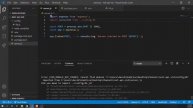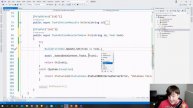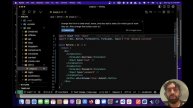Index Full Scan - Oracle SQL Tutorial
Index Full Scan is a free tutorial by Oracle Master Training � 60,000+ Students Worldwide from Oracle SQL course
Link to this course(Special Discount):
https://www.udemy.com/course/sql-performance-tuning-masterclass/?ranMID=39197&ranEAID=Gw%2FETjJoU9M&ranSiteID=Gw_ETjJoU9M-WntX2fiZJ5xHRHemlpLdTQ&utm_source=aff-campaign&LSNPUBID=Gw%2FETjJoU9M&utm_medium=udemyads
This is the best Oracle SQL Course
Course summary:
Learn How to Solve Critical Performance Problems with Step by Step Approach!
Learn Advanced Indexing Techniques for Ultimate Database Performance!
Learn How to Use Various Performance Tuning Tools for In-Depth Assistance!
Maximize the Query Performance by Using Advanced Tuning Tecniques!
Learn Oracle Database Architecture by ""Tuning"" aspects.
Identify and Optimize the Performance of poorly performing (bad) SQLs.
Understand SQL Tuning Terminologies
Learn How to Create ""Better"" Queries
Learn How to Prioritize your SQL Tuning Efforts.
Learn the Details of How an SQL Code is Interpreted
Learn Useful Hints to improve Performance of your Queries
Learn & Improve How to Use Oracle Optimizer and Execution Plans Well
Various Tips and Tricks to make the Oracle SQL queries run faster.
Oracle Performance Tuning on both Oracle11g and Oracle12c Environment.
Learn Efficient Schema Design
Lifetime Support from the Authors.
Weekly Quizzes & Assesment Tests
Working materials and always up to date!
English [Auto]
Think like high in this lecture you receive the index full scan access pass in details we know that indexes create index entries for older homes. I mean if our table has 1 million rows or index well how entries for older roles. Actually this does not mean that if we have 1 million rows we will have 1 million entries and then we can store multiple Royds basically in an Index index entries include all the row ideas of the related table. So in the end one million rows will be indexed somehow. So you may think that why the optimizer performs an index full scan then instead we can go to the table and read from the table directly. Because as you know reading from the index also needs to read from the table. In most cases so we will perform two operations respectively and this will increase the cost. Actually it is not true for all cases sometimes reading the whole index and then reading the whole table with the related ideas will be faster than reading directly from the table. So how can that happen. If our query has an order by with the indexed columns even if we read all eight of a table reading by using the index will be faster than reading directly from the table because this whole operation is a really costly operation. And if the element is that all code will return the result faster. And since our index is already how the key is in disordered order if you read by an index and read two rows by the index row IDs it will be faster than reading the table and then sorting the rows. Second if all query has a group by clause and that group by clause consist of only the columns of an index it will perform an index foolscap. It will be first and foremost cases because since the columns are ordered in the index it will group the rows much easier. So instead of reading the whole table and trying to group the mixed values it will be easier to grow of the order values. So it took power for an index full scan and group them easily the last condition that the optimizer chooses to perform index full scan is if the query requires the sort merge join in Fort Worth joins the optimizer will consider the index full scan because using an already sort of blocker will ease its job. All right. So in all these conditions the optimizer performs an index full scan to improve the performance. But in order Y and sort more join conditions the order of the index columns must match with the indexing order. I mean for example if you created your index on our player id and first name sequentially. If you write first name first it may not perform an index scan but will perform a full table scan or maybe it will perform an unnecessary sort of operation with the index full scan. But in a group by clause there is no need for that. I mean the order of the columns in the group by clause is not so important Great. Now let's open up their SQL developer and make some examples about that. In the first example we queried for all the rows and used an order by with a department ID column Department ID column has an index on it. Now let's get its execution plan. As you can see it's part from that index foolscap. So if we use ORDER BY clause with indexed columns it may perform an index for scan in the next example. I used another index in the Employees table last name and first name columns are indexed together. The order is last name and then first name so in this example I typed only the last name column in the order by clause. Let's get its execution plan and see what happens. As
Видео Index Full Scan - Oracle SQL Tutorial автора MySQL Базы данных для самообучения
Видео Index Full Scan - Oracle SQL Tutorial автора MySQL Базы данных для самообучения
Информация
8 декабря 2023 г. 8:45:16
00:09:35
Похожие видео






















